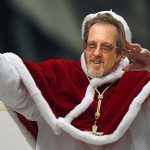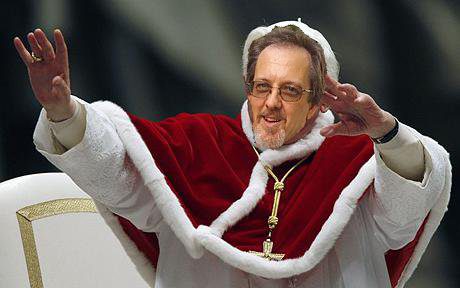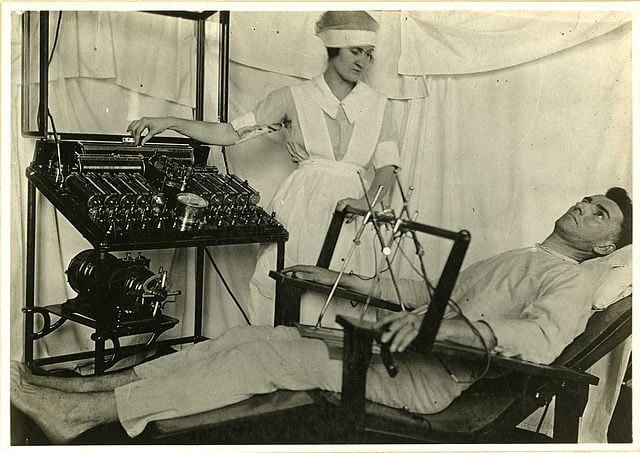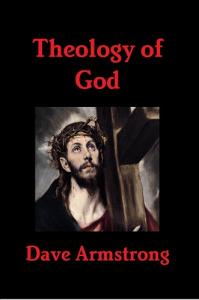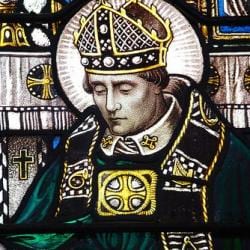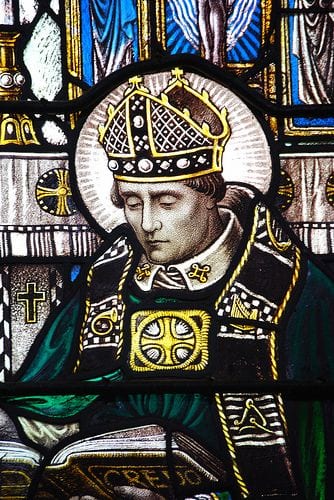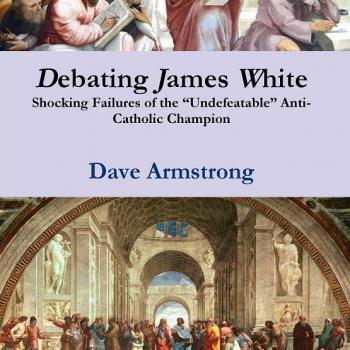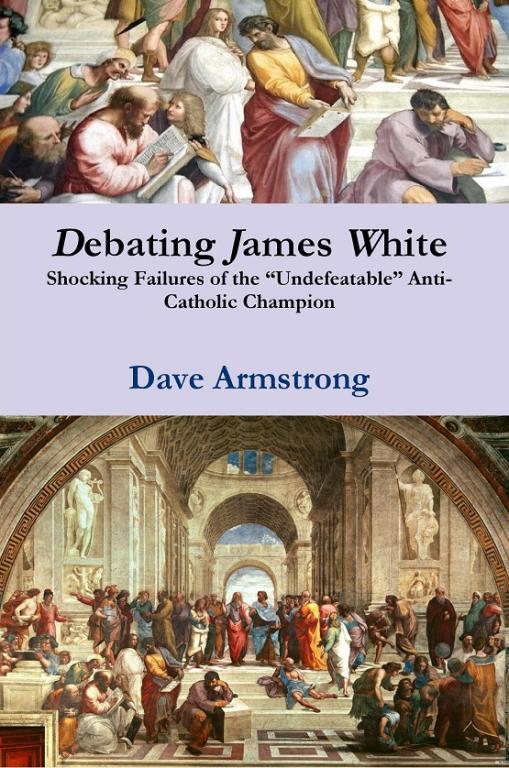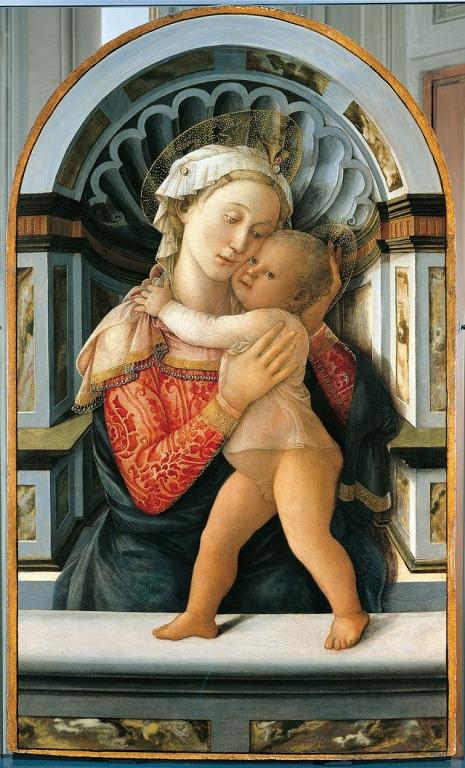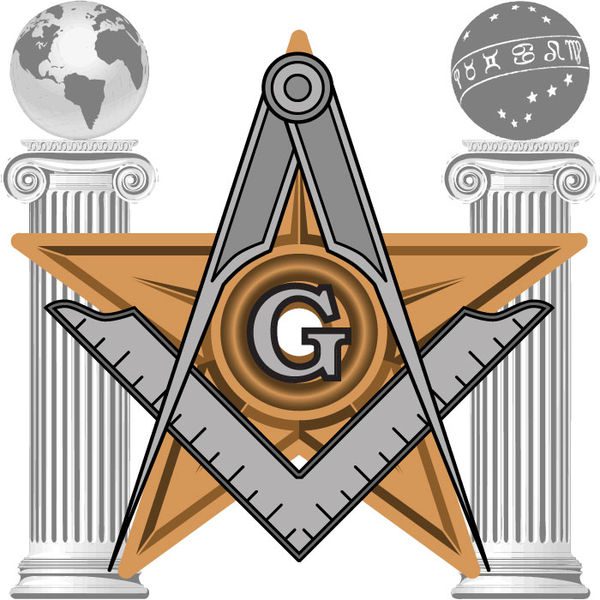
The Masonic world conspiracy raises its ugly head again: soon to take over the Catholic Church (so we are told), in league with the dreaded “Bergoglianism” (Image: “The Freemasonry Barnstar”) [public domain / Wikimedia Commons]
* * *
A new round of discussions have occurred as a result of my post, Hilary White: Radical Catholic Reactionary Extraordinaire: in its combox and also on my Facebook page, where I cross-posted it. Amidst (or despite) the cacophony of various Hilary cheerleaders and detractors of yours truly, she and I managed to do at least a little back-and-forth. I don’t think we accomplished all that much, but I believe that the exchanges may at least make the disputes at hand (and the categories involved) more understandable to readers, if they can read both sides in confrontation with each other.
Her words will be in blue. I’ve tried to reproduce the chronological order as best I can, but it’s very confusing, with two major threads and sub-threads within both, and readers may consult the original sources at the links above. As always in my posted dialogues, I am most interested in preserving a socratic / “Kreeftian” back-and-forth format.
* * * * *
I didn’t actually make those cards. I pinched em from a friend who did’t want attribution. But they were hilarious, weren’t they.
They are within the reactionary paradigm / bubble (much humor is social context- or “insider”-dependent). For the rest of us they are merely misguided and silly.
Helen Westover: What did Hilary say that was factually incorrect, Dave?
That I’m not a Catholic (among a couple dozen other things).
Funny, I’ve never actually said anything about you in my whole life, that I can recall, Dave. But hey… that’s OK. I get that having a huge crush on someone sometimes plays tricks on the mind.
. . . . which is absolutely, perfectly irrelevant. I never said that you did.
“That I’m not a Catholic (among a couple dozen other things).” … Ummm… right there. In this thread.
Obviously, I am part of the group of “Novusordists” that you deny are Catholic at all.
Well, not knowing you at all, or ever having read you, I’d say that your having so enthusiastically taken on the title, says more about your own problems with the Faith than anything else. You are the one who has adopted this term, publicly pretended not to know what it means, got into a nearly daily tizzy over it,
[later: related] I mean, simply, you’re the one calling yourself a “novusordoist” and then blaming me for the term you are so enthusiastically adopting. “You called me a…” No. I’ve never called you anything. You call yourself that. Deal.
As for “nearly daily tizzy”: this is just one of many topics I deal with as an apologist. I have over 50 web pages: each devoted to different aspects of the faith or ethics (like pro-life or the contraception issue), etc.
Thanks for clarifying. Language must be interpreted within context. First you said I claimed you were talking about me personally. I clarified that I was simply using myself as one in the class of what you call “novusordists.” Helen in this thread asked: What did Hilary say that was factually incorrect, Dave?”
So instead of going through the whole bit about how you redefine millions out of the proper term “Catholic” (I reply to dozens of comments every day), I expressed it simply and more easily by using myself as an example of the class you refer to, saying, “That I’m not a Catholic.” In other words, I’m one of the class of people whom you disparage. It’s false. You misinterpreted that as me claiming that you were talking about me personally.
I explained / clarified that by saying, “Obviously, I am part of the group of [implied: what you call] “Novusordists” that you deny are Catholic at all.” Now you claim that I call myself a “novusordist.” I do not. Again, it was a rhetorical comment stated within your paradigm in the midst of a dispute. You came up with the stupid term. I dispute it. It’s contentious and quasi-schismatic, just as “Neo-Catholic” is.
The whole thing is symptomatic, I think, of the difficulty that reactionaries (being a species of fundamentalism) have with language in context and with categories; with an accompanying ubiquitous legalism. If I’ve seen it once, I’ve seen it a thousand times.
spent who knows how many hours yelling at the Trads for identifying this distinction,
It’s a serious error, and so I treat it accordingly, but it’s not all that I do, by a long shot. Spending twenty minutes looking over my 1600 + paper and 49 books would prove that to you.
all the while not one of us has ever given you the slightest thought.
I couldn’t care less whether you do or not. As I said, I am refuting what I believe to be serious error. It’s all part of being an apologist.
You’ve made us a great deal more important to you than you are to any of us. Sorry, but it’s the case.
One has to note error by the names of the people sometimes. By the same token, we could argue that St. Augustine “made” the Donatists or Pelagians or Manichaeans “more important” by refuting their errors, or that St. Athanasius provided the same service to the Arians. I don’t see how it could be otherwise. I can hardly warn my readers about big errors in your writings without naming you.
Personal attacks and quite a lot of quoting kind of indicates to me that the problem isn’t with us or anything we may or may not be saying. It’s with you.
Huh? Again, the serious critic must cite the ones whom he is criticizing. It’s called “documentation.” The importance and necessity of it is hardly something that any serious thinker disputes. So why do you? You’re an intelligent person. Why would you argue for something so silly as to contend that my citing your words is proof positive that I have some serious “problem” of character or intellect? LOL
Also, never in my life denied that Novusordoists are Catholic. Quite the opposite, in fact. Or, perhaps more accurately, that there are a lot of Catholics out there who are stuck in a Church that has abandoned the ancient Faith and failed to tell anyone the full truths of the Faith.
I’m glad to hear you say this now; however, if English is what it is, you in fact have denied it, as I showed in my paper. You have a tag called, “Novusordism isn’t Catholicism”.
So either that was some sort of sarcastic non-literal comment (in which case I would argue that it is quite confusing to readers), or it is in direct contradiction to what you are saying now:
“Novusordism isn’t Catholicism”
vs.
“never in my life denied that Novusordoists are Catholic. Quite the opposite, in fact.”
You have another tag called, “Pssst… It’s a different religion.” And you wrote:
“The premise here is that the old religion is not the same as the new, and that as time has passed since the year of grace 1965, the rift between the two religions competing for space within the same Church has grown wider.”
The use of “neo-Catholic” is a third indication.
Now, the word “religion” according to general and scholarly use, refers to Christianity or Catholicism as one type of Christianity. That’s what “religion” normally refers to. But I suppose you could be using the word in an entirely different, arbitrary way. Anything is possible these days.
People go along their whole lives with the best will in the world, quite rightly trusting the local parish or the local bishop or even the pope, not to lie to them or omit important truths. But some of us have just looked a little too hard and too long at the contradictions to just continue blindly accepting what we are told. Again, I don’t know you from a hole in the ground, but I have always assumed you are a Catholic, that you want to be a Catholic, and the best one you can be. Novusordoism is just a nickname, shorthand for the neo-Modernism infiltration that burst onto the scene after Vatican II and has so got a stranglehold on the Church’s institutions that it has forced many of us to go looking for the truths of the faith in the old books.
The result is that many of us have been able to identify a difference, and start to make a taxonomic distinction between what was being taught for all those centuries, and what is being passed off today as Catholicism, but resembles it only superficially. But if you want to continue to pretend that you’re persecuted, by all means. If I ever gave you a moment’s thought – mainly when you were standing on your virtual soapbox yelling insults at me, it would only be to think that you are one of those millions of Catholics who have been successfully duped by bad men for evil reasons, and if I had or have any wish for you it is that you learn the painful but true things I’ve learned and come out of the matrix.
What is this “matrix” I need to come out of? I’m quite content as an orthodox Catholic, thank you. If I have to start talking like you: the radical Catholic reactionary mindset, which is similar in many ways to modernism and Protestantism both, I’d rather go back to my former evangelical Protestantism, thank you. Better to bash the pope and papacy as a real Protestant (as I used to be, and do) than to bash him and lie about him as a Catholic . . .
Next time you feel the urge to insult me in public (and believe me, it really doesn’t matter that much to me – I’ve been in this business for a very long time) perhaps for your own good, to fulfill the requirements of justice, you could just send me an email and ask what I mean.
Public posts are fair game for public criticism. This is not a “personal” issue and never was, but the competition of ideas. I quoted from your public posts. One of them happened to mention my name, and that’s how I first became aware of it. I didn’t force you at gunpoint to mention my name alongside that of Jimmy Akin and Mark Shea (somehow, though never “having read” my stuff). You voluntarily did that. And so I made a reply and started doing more research about your views, and discovered that you were far more radical than I had previously understood.
The only reason I’m bothering to respond is that I really do have nothing against you whatever. I assume, judging from the title of the blog that your interest is in correcting the misapprehensions of Protestant fundamentalists. There aren’t a lot of these in Italy, but I assume there are still some in the US who need this very much. Sounds like perfectly useful work. I have never really detected any serious malice from you any of the times you’ve attacked me online, and you’ve certainly generously quoted me and accurately, so in your case, I suppose it bothers me even less, which is why I made light of it on my blog and decided to have a bit of fun (which you joined in on, I add). I’ve been attacked many times over the years, and I usually just ignore it because there really never does seem to be much point in responding to that kind of … well.. call it what it has been: hatred. From you I detect no such thing.
But seriously, you’re starting to sound a little unhinged about the whole “she says I’m not a Catholic” thing. Why take something so very personally, why adopt the term “novusordoist” for yourself and then blame me for it? Aren’t you a Catholic? I thought you were.
Thank you for making clear that there is no malice whatever from me. Nor do I think that about you, especially after this quite charitable remark. So that is out of the way . . . The “novusordoist” / supposedly taking things personally bit was explained [above].
[replying to someone else] They’re [Hilary’s statements that I objected to] falsehoods. That’s why I object to ’em. I’m not very fond of lies. They come from the devil, after all.
Demonstrate that they are in error, by all means,
I’m not gonna sit and debate the entire radical Catholic reactionary “platform.” But (for whomever is interested), I have dealt with it repeatedly, in two books [one / two]. I defended Pope Francis in another book. And I have defended him further by collecting many articles: currently numbering 184 (including several of my own, that were written after my book).
Pewsitter: a sort of radical Catholic reactionary Drudge Report, that provides lots of “hot” links, mocked this reply as follows (thanks much for the additional traffic, guys!):
“Patheo’s Armstrong warns: Terrible Catholic reactionary Hilary White’s no match for my big hat, my beard, my one book and lengthy compilation of articles defending Francis!”
[with picture of a hat]
but I’m not calling you a liar or mendacious, why lob that accusation at me? Why, in fact, the assumption of bad will?
I don’t assume bad will. Again, it is a language-in-context thing (now the third time you and I have gone through that). One can tell a lie without being either a “liar” by character or insincere. One meaning of “lie” is simply “falsehood.” Look it up in a dictionary if you don’t believe me. I implied that in the comment itself, by basically using the two words synonymously. CONTEXT.
I used “lies” in my last two sentences because it was an indirect reference to the biblical “He is the father of lies.” None of that implies deliberate deceit; and I want to make it clear that this is not my charge against you at all.
When it’s a lie that’s not intended, in English we call that an “error” or a “mistake.” I think you will find Thomas agreeing that in order to be a lie, the intention to deceive has to be present. When you call someone a liar on the internet, what are are saying is that the person has a wicked intention. This is what we call “calumny” and it is generally frowned upon in Catholic moral theology.
I’ve been through this a number of times. As a professional writer and one very concerned with definitions as a crucial component of the nature of my own work (apologetics), I am as concerned with accurate terminology as you are, I can assure you.
You must have me confused with the Republican candidates. I haven’t used the word “liar” at all. I haven’t “evolved” from alleged instances of calling you a “liar” or alleging deliberate deceit to being nice because you have behaved nicely in our exchanges.
One can certainly use the word “error” or “mistake” or “falsehood” or “untruth”: sure. I used “falsehood” myself in the context of using “lie.” But one can also use the word “lie” in its second dictionary sense. You appear to doubt that, so now I have to take the trouble to document it.
Dictionary.com (Random House Dictionary): The third meaning of the noun is listed as “an inaccurate or false statement; a falsehood.”
Merriam-Webster Online: definition 1b: “an untrue or inaccurate statement that may or may not be believed true by the speaker”
I either intended this meaning or I did not. It’s a legitimate dictionary use. I would argue (as I have already) that my meaning was made clear in context; moreover, I have now clarified twice exactly what I meant. I’m not lying to you about it (neither in the primary nor secondary sense)! :-)
Likewise, Roget’s Thesaurus lists a number of “non-deceptive” synonyms, such as untruth, disinformation, falsehood, fiction, inaccuracy, myth, tale, fable, falsity, misstatement, and tall story.
I suppose you could start arguing against standard dictionaries, but I don’t see how that is a very fruitful or constructive path to go down.
Steve Jalsevac: Just to let you know, Hilary was, for the several years that she was with us, one of the finest LifeSite writers and she was highly regarded by many subscribers and others, including many Catholic clergy, who appreciated her frank, personal style and her excellent command of the English language. We are delighted to still have her large number of reports in our public archives for reference. There is not one of them that I would remove. I would not classify any of those reports as “reactionary”. They were just honest and usually well researched. Every LifeSite reporter has their particular character and way of writing and particular take on developments. Hilary’s reports often had a unique British-like bluntness and humorous twists that many appreciated.
She has many fine qualities, I’m sure. But her current views of the pope and of those who go to the Pauline Mass do not reflect the facts and due reverence for the Holy Father. They are not the views that mainstream traditionalists hold, and so for that reason I place them in the category of “radical Catholic reactionary.”
Sorry; for the life of me, I don’t know how else to classify characterizations such as “Novusordism isn’t Catholicism” or “Pssst… It’s a different religion” (both tags) or outrageously describing Pope Francis views as: “There is no such thing as immutable truth because there is no such thing as immutable reality. God has no immutable nature, nor does man. . . . All this more or less means, according to the Bergoglian logic, that a truly faithful Catholic is one who abandons Church teaching when he is told to. . . .”
Hilary seems nice; even charming, and is a stylish writer. I have nothing against her personally, as she charitably acknowledged today.
But I have to disagree with these ideas because I believe them to be extremely harmful to the Body of Christ and the Catholic Church and Catholics. If you don’t like “reactionary” then I could call it rigorism, which is an historical term, used for schismatic sects like the Donatists and Novatians, etc.
Thanks Steve and Dave both. I think our interactions here and on FB have considerably raised the tone of the discussion. We’ve moved on to “I disagree” which beats the heck out of “she’s an evil liar!” I’d call that progress.
I didn’t move from one position to the other because I never held that you were an “evil liar” in the first place! I think you believe things that are tragically wrong and false (second dictionary meaning of “lie”).
I’ve been called a number of untrue things here from your supporters and comrades, and was mocked at Pewsitter, etc., but you don’t see my readers personally attacking you here, nor on my Facebook page. Perhaps a few zingers here and there . . . And you don’t see it because I have a very strict policy on my pages against personal attacks.
“Romulus”: I don’t think you know what “reactionary” means. And what is a “rigorist”, if you please? Was St. Benedict a rigorist? He had rather firm views, you know. So did Jerome. So did Francis (the original one). So did Catherine of Siena. Was there something not quite right about their practice of the Faith?
All those saints are great. What I’m talking about was very well expressed by Blessed Cardinal Newman (drawn from one of my three quotations books from his works). This is rigorism:
[Y]ou are making a Church within a Church, as the Novatians of old did within the Catholic pale, . . . you are doing your best to make a party in the Catholic Church, and in St Paul’s words are ’dividing Christ’ by exalting your opinions into dogmas, and shocking to say, by declaring to me, as you do, that those Catholics who do not accept them are of a different religion from yours. I protest then again, not against your tenets, but against what I must call your schismatical spirit. (Letters and Diaries, v. 23; To William G. Ward, 9 May 1867)
It is no trouble to believe, when the Church has spoken; the real trouble is when a number of little Popes start up, laymen often, and preach against Bishops and Priests, and make their own opinions the faith, and frighten simple-minded devout people and drive back inquirers. (Letters and Diaries,v. 23; To Edward B. Pusey, 21 July 1867)
Now, today, Hilary denied more than once (in reply to me) that she thinks folks who attend the Novus Ordo Mass are not Catholics. But I noted her language where she said straight out that they were not (no reply as of yet). In an article today (2-15-16) on her blog she again reiterates the same thing that I have criticized:
This isn’t the first time the structures of the Church have been taken over by an heretical sect . . .
[she cites St. Basil, but he doesn’t say that the entire Church, including the pope, had been subverted into heretical garbage. The Donatists and Novatians and Montanists and others said stuff like that, though]
This more or less sums up what worries me most about the Novusordoist sect. It offers an easygoing, friendly and socially acceptable impiety that everyone can love. It’s religious Soma.
I suppose, looking back through the long history of the heresies, that’s more or less what they all do. Every heresy ever offered in exchange for the Faith has done the same sort of thing . . .
She can’t have it both ways. She wants to say she’s not denying that we non-reactionaries and non-rigorists are Catholics, yet she uses this terminology. If our beliefs amount to being “an heretical sect” and is compared to “very heresy ever offered in exchange for the Faith” it ain’t Catholic! It’s heretical; it’s another “religion.” She has stated all these things in plain English, and we aren’t stupid. We know what words mean. I’m not pulling them out of a hat. How I wish she hadn’t written these things!
Again, in an article dated 10-24-15 for The Remnant, Hilary wrote: “I have said it for many years now: Novusordoism. Is. Not. Catholicism. Trads know this.” [my italics emphasis]
More of Hilary White’s radical opinions come from a Remnant column of 10-12-15, complete with Freemason conspiracy theories (my bolding):
I have believed for a long time that however it was done – the details are at this stage not so important – Vatican II was used by the enemies of Christ to inject an entirely new, false religion into the existing structures of the Church. They injected this poison, this antireligion, that then began to spread like a virus, infecting the entire body one cell at a time. It rewrote the spiritual DNA of religious orders and academia first, then spread to the diocesan structures, the national bishops organisations and international charitable agencies. And finally, in March 2013, the enemy took the citadel.
Now we know quite concretely what the next phase will be and we’ve got a pretty good idea of the timeline. Danneels and his friends, including Bergoglio, believe that the war was over that night and it is clear they are moving forward with the plan for the final liquidation of the Catholic Church’s doctrinal foundations – starting with sexual morality – to transform her into a vehicle for secular humanist, Freemasonic ideologies, like a colossal spiritual syringe full of “merciful” poison to be administered to the whole world.
In the last weeks and months, the only really new information are the details of what exactly it will look like, coming mainly from interviews with Pope Bergoglio’s closest collaborators. What will happen next month at the Synod and after is nothing more than the formal installation and recognition of the new religion, and the final expulsion of the old religion of Christ. We will be introduced to the religion of Kasperism, of Bergoglianism, of Neomodernism, in short. Or as it was described elsewhere, the “abomination of desolation in the sanctuary.” What we Old Narnians must do after that, what it will be possible for us to do, remains to be seen.
Lastly, Hilary made very clear what contempt she has for the Second Vatican Council (whose authority Cardinal Ratzinger in the 1985 Ratzinger Report equated with that of Trent) in another article for The Remnant (7-31-10; cross-posted at Rorate Caeli on 8-29-10):
Benedict is of that generation that put all their eggs into the Vatican II basket and is determined to “make the council work”. This despite that 45 years after its close, they are still arguing over what its purpose was. Like nailing Jell-O to the wall. Younger Catholics, those of us that are left in the pews, simply cannot understand this obsession of the last generation with that monumental failure. But for the Ratzinger generation, “The Council” defined Catholicism, and it seems they cannot be convinced to give it a dignified burial.
I quite like “radical” and I would say that if you give it the original definition it fits quite well. Catholic radicals have made quite a mark on our history, starting with St. John the Baptist and going through to wild-eyed characters like St. Maximilian Kolbe, though I balk at being placed in such august company in any way other than to enjoy the descriptor in a superficial way.
I suggest, Dave, that at least some of your difficulty with the things I and my fellow radicals say is not so much disagreement with substance as misunderstanding of terminology. I would encourage you to continue refining your personal definition “radical Catholic reactionary,” since this would force you to do more reading. While serviceable in the context of your blog, and of course your own mind, the adoption of the term “reactionary” is more in the way of an epithet than a descriptor.
As we learned from Aristotle, a small error at the beginning will inevitably lead to larger and more consequential errors further on, and he insisted that the only way to approach a question or phenomenon is to start with accurate definitions. So, though inaccurate as far as they go because of a poor choice of words (do look up “reactionary” as soon as you can) I actually rather applaud your effort to create a definition that can be used more generally. I would suggest you keep at it.
Yes, I like “radical” too, and it can have a quite positive meaning. As a Protestant evangelical missionary out to change the world in the mid-80s, I liked to refer to myself as a “radical Christian.” This is one reason I included it in my coined term, “radical Catholic reactionary.” The “reactionary” part is what most object to. No one likes that term. So you are “radical” and “committed” in your view as well. I just think it is in error and a gravely mistaken viewpoint (to use gentler words).
I have indeed thought quite a bit about the word and have debated the utility and accuracy of it with traditionalist friends and reactionaries who consider me their “enemy” and equivalent in character to Attila the Hun and Vlad the Impaler.
I already linked to my lengthy definition from one of my books, in my first paper. Furthermore, in October 2013 I wrote my post, Rationales for My Self-Coined Term, “Radical Catholic Reactionaries”.
It was all discussed at extreme length at the time with traditionalist friends (some liked it, some didn’t) and with fellow apologists like Karl Keating and others. My term was a deliberate attempt to replace the term “radtrad” and I have written at length about that as well, including serious research about where it came from and my explanation for why I stopped using it.
I also have written several times about my objections to the silly term, “Neo-Catholic” [one / two / three].
I even have the paper, Am I a Catholic Traditionalist? (YOU Decide!).
In many ways, I am. I have attended Latin Mass for 25 years (Novus Ordo; my parish also offers the EF). I receive communion kneeling at an altar rail on the tongue. I critique the over-use of eucharistic ministers and try to always personally receive from a priest. I defend ad orientem, I am an enthusiastic advocate of wider availability of the Tridentine Mass, I defend all Catholic doctrines, no matter how controversial, such as the prohibition of contraception and masturbation and premarital sex, the unnatural nature of sodomy, Mary Mediatrix, and her perpetual virginity in partu.
I have the most extensive critique pages online from a Catholic, perspective, of Luther, Calvin, Lutheranism, and Calvinism. I’ve edited an abridgment of the Summa and did a trilogy of patristic quotations [one / two / three]; also a trilogy of Cardinal Newman quotations [one / two / three]. I collected the thoughts of the great mystics and contemplatives. I’ve written books critiquing Luther and Calvin, Calvinism, and anti-Catholicism and modernism. I’ve written two in opposition to sola Scriptura.
The list goes on and on. But where we differ is in identifying the causes and solutions to the crisis of modernism. We are polar opposites regarding what I believe are the four distinctives of reactionaryism: Vatican II, the Pauline Mass, ecumenism, and Pope Francis.
Yet we have a lot in common, I enjoy talking to you, and I can even say that I like you as a person. Believe me, if we apologists made every issue “personal” we would be the most miserable of all people. I’m strictly concerned with dealing with the theological and philosophical issues; not in judging people’s hearts.
You and I can at the very least demonstrate that it is possible for people to talk cordially to each other, despite huge disagreements.
As for the word, reactionary, here is the definition from The American Heritage® New Dictionary of Cultural Literacy, Third Edition (Copyright © 2005 by Houghton Mifflin Company):
An extremely conservative person or position that not only resists change but seeks to return to the “good old days” of an earlier social order.
Sounds exactly relevant to me. I’ve simply applied it to religious issues, which have to do with the “social order” as well. “Change” in the context of our discussion would be Newmanian “development” rather than “evolution of dogmas” (which is a heresy).
Döllinger resisted the developmental change of [de fide, ex cathedra] papal infallibility in 1870 (Vatican I) and so was excommunicated.
Y’all resist the consistent developments of Vatican II and so are on the verge of schism and in danger of crossing that line, should you continue down this path. There are always people who don’t “get” what the latest ecumenical council has revealed about the continuously developing Mind of Holy Mother Church




